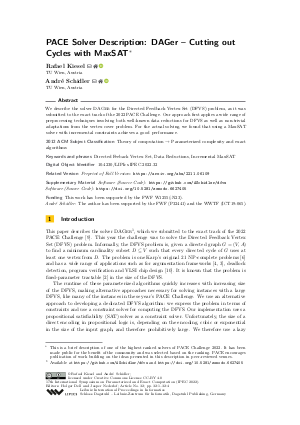PACE Solver Description: DAGer - Cutting out Cycles with MaxSAT
Authors
Rafael Kiesel  ,
André Schidler
,
André Schidler 
-
Part of:
Volume:
17th International Symposium on Parameterized and Exact Computation (IPEC 2022)
Part of: Series: Leibniz International Proceedings in Informatics (LIPIcs)
Part of: Conference: International Symposium on Parameterized and Exact Computation (IPEC) - License:
 Creative Commons Attribution 4.0 International license
Creative Commons Attribution 4.0 International license
- Publication Date: 2022-12-14
File

PDF
LIPIcs.IPEC.2022.32.pdf
- Filesize: 0.55 MB
- 4 pages
Document Identifiers
Related Versions
- Preprint of Full Version https://arxiv.org/abs/2211.06109
Subject Classification
ACM Subject Classification
- Theory of computation → Parameterized complexity and exact algorithms
Keywords
- Directed Feeback Vertex Set
- Data Reductions
- Incremental MaxSAT
Metrics
- Access Statistics
-
Total Accesses (updated on a weekly basis)
0PDF Downloads0Metadata Views
Abstract
We describe the solver DAGer for the Directed Feedback Vertex Set (DFVS) problem, as it was submitted to the exact track of the 2022 PACE Challenge. Our approach first applies a wide range of preprocessing techniques involving both well-known data reductions for DFVS as well as non-trivial adaptations from the vertex cover problem. For the actual solving, we found that using a MaxSAT solver with incremental constraints achieves a good performance.
Cite As Get BibTex
Rafael Kiesel and André Schidler. PACE Solver Description: DAGer - Cutting out Cycles with MaxSAT. In 17th International Symposium on Parameterized and Exact Computation (IPEC 2022). Leibniz International Proceedings in Informatics (LIPIcs), Volume 249, pp. 32:1-32:4, Schloss Dagstuhl – Leibniz-Zentrum für Informatik (2022)
https://doi.org/10.4230/LIPIcs.IPEC.2022.32
BibTex
@InProceedings{kiesel_et_al:LIPIcs.IPEC.2022.32,
author = {Kiesel, Rafael and Schidler, Andr\'{e}},
title = {{PACE Solver Description: DAGer - Cutting out Cycles with MaxSAT}},
booktitle = {17th International Symposium on Parameterized and Exact Computation (IPEC 2022)},
pages = {32:1--32:4},
series = {Leibniz International Proceedings in Informatics (LIPIcs)},
ISBN = {978-3-95977-260-0},
ISSN = {1868-8969},
year = {2022},
volume = {249},
editor = {Dell, Holger and Nederlof, Jesper},
publisher = {Schloss Dagstuhl -- Leibniz-Zentrum f{\"u}r Informatik},
address = {Dagstuhl, Germany},
URL = {https://drops.dagstuhl.de/entities/document/10.4230/LIPIcs.IPEC.2022.32},
URN = {urn:nbn:de:0030-drops-173885},
doi = {10.4230/LIPIcs.IPEC.2022.32},
annote = {Keywords: Directed Feeback Vertex Set, Data Reductions, Incremental MaxSAT}
}
Author Details
Funding
This work has been supported by the FWF W1255(-N23).
- Schidler, André: The author has been supported by the FWF (P32441) and the WWTF (ICT19-065).
Supplementary Materials
- Software (Source Code) https://github.com/ASchidler/dfvs
- Software (Source Code) https://doi.org/10.5281/zenodo.6627405
References
-
Ali Baharev, Hermann Schichl, Arnold Neumaier, and Tobias Achterberg. An exact method for the minimum feedback arc set problem. Journal of Experimental Algorithmics (JEA), 26:1-28, 2021.

-
Jianer Chen, Yang Liu, Songjian Lu, Barry O'Sullivan, and Igor Razgon. A fixed-parameter algorithm for the directed feedback vertex set problem. In Cynthia Dwork, editor, Proceedings of the 40th Annual ACM Symposium on Theory of Computing, Victoria, British Columbia, Canada, May 17-20, 2008, pages 177-186. ACM, 2008.

-
Wolfgang Dvorák, Markus Hecher, Matthias König, André Schidler, Stefan Szeider, and Stefan Woltran. Tractable abstract argumentation via backdoor-treewidth. In AAAI 2022, 2022.

- Wolfgang Dvorák, Sebastian Ordyniak, and Stefan Szeider. Augmenting tractable fragments of abstract argumentation. Artif. Intell., 186:157-173, 2012. URL: https://doi.org/10.1016/j.artint.2012.03.002.
- Michael R. Fellows, Lars Jaffke, Aliz Izabella Király, Frances A. Rosamond, and Mathias Weller. What is known about vertex cover kernelization? In Hans-Joachim Böckenhauer, Dennis Komm, and Walter Unger, editors, Adventures Between Lower Bounds and Higher Altitudes - Essays Dedicated to Juraj Hromkovič on the Occasion of His 60th Birthday, volume 11011 of Lecture Notes in Computer Science, pages 330-356. Springer, 2018. URL: https://doi.org/10.1007/978-3-319-98355-4_19.
- Richard M. Karp. Reducibility among combinatorial problems. In Raymond E. Miller and James W. Thatcher, editors, Proceedings of a Symposium on the Complexity of Computer Computations, held March 20-22, 1972, at the IBM Thomas J. Watson Research Center, Yorktown Heights, New York, USA, The IBM Research Symposia Series, pages 85-103. Plenum Press, New York, 1972. URL: https://doi.org/10.1007/978-1-4684-2001-2_9.
-
Mile Lemaic. Markov-chain-based heuristics for the feedback vertex set problem for digraphs. PhD thesis, Universität zu Köln, 2008.

-
Hen-Ming Lin and Jing-Yang Jou. On computing the minimum feedback vertex set of a directed graph by contraction operations. IEEE TCAD, 19(3):295-307, 2000.

- Christian Schulz, Ernestine Großmann, Tobias Heuer, and Darren Strash. Pace 2022. URL: https://pacechallenge.org/2022/.
-
Abraham Silberschatz, Greg Gagne, and Peter B Galvin. Operating System Concepts. JW Wiley, 2018.

-
Ulrike Stege and Michael Ralph Fellows. An improved fixed parameter tractable algorithm for vertex cover. Technical report/Departement Informatik, ETH Zürich, 318, 1999.

